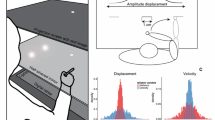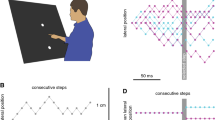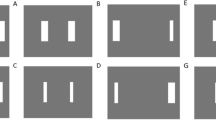Abstract.
When hitting a target that is moving, the time for planning the interception is limited. Instead of waiting for all the necessary information about the target's position and speed before starting to move, subjects could use their previous experience with similar targets to make initial guesses and adjust as new information becomes available. In the present study we examined whether the speed of the preceding target influences a hitting movement. Subjects hit moving targets that appeared on a screen about 40 cm in front of them. The targets moved at 6, 12 or 18 cm/s. Both the hand's initial movement direction and the final hitting error depended on the speed of the preceding target. We conclude that people control the way they hit moving targets on the basis of the speed of the preceding target.
Similar content being viewed by others
Author information
Authors and Affiliations
Additional information
Electronic Publication
Rights and permissions
About this article
Cite this article
de Lussanet, M., Smeets, J. & Brenner, E. The effect of expectations on hitting moving targets: influence of the preceding target's speed. Exp Brain Res 137, 246–248 (2001). https://doi.org/10.1007/s002210000607
Received:
Accepted:
Issue Date:
DOI: https://doi.org/10.1007/s002210000607




